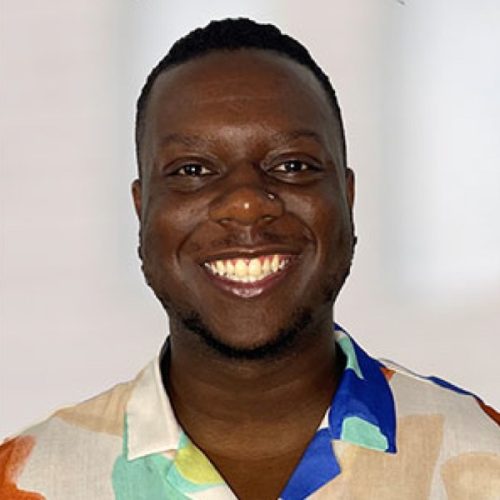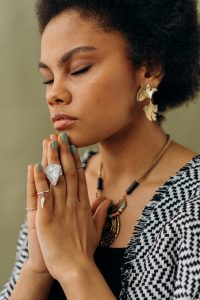By Joshua Levi Perrin
In an age shaped by scrolls as much as sermons, Black spirituality is undergoing a transformation. While church pews may not be as consistently filled as generations past, conversations about faith, healing and ancestral connection have grown louder—this time across podcasts, social media timelines, and dinner tables.
Among Black Millennials and Gen Z, spiritual life and religion is no longer confined to Sunday mornings or sanctuary walls. It’s being explored, questioned, celebrated, and sometimes reclaimed in ways that challenge traditional definitions.
This shift isn’t simply about walking away from church; it’s about seeking spiritual lives that feel more whole, honest and aligned with personal and collective truths. According to Pew Research Center, 40% of young adults now identify as religiously unaffiliated—reflecting a generational move away from institutional religion toward more personal forms of belief and meaning-making.
Recent cultural moments reflect this evolution. Early reactions to Ryan Coogler’s film Sinners sparked passionate dialogue online, as have popular podcasts and TikTok conversations revisiting everything from purity culture to megachurch influence.
On one platform, users might post reverent reviews of beloved local congregations; on another, they critique performances of faith that feel disconnected from the struggles of everyday life. In both cases, the conversation reflects a hunger for spiritual experiences that meet people where they are—whether it’s TikTok users sharing altar setups, podcast hosts unpacking religious trauma and church hurt, or creators like The War Saint (@thewarsaint) and Shanti Shanti (@omshanti11333) offering meditations, rituals, and history lessons rooted in Black diasporic traditions.
For many—including myself—this evolution isn’t theoretical. I was raised in a religious family—like many southerners, and especially many Black southerners. My father was a preacher, and both of my grandfathers were deacons. Faith shaped much of my early life. But even then, I was encouraged to ask questions. Curiosity wasn’t seen as disrespect—it was almost expected.
As I got older, I began exploring other spiritual paths through digital spaces. Over time, I came to see spirituality not as something fixed, but as a lifelong process. For me, it’s not about finding one right answer—it’s about paying attention to what feels real: the emotions, the questions, the actions. My spiritual path is rooted in curiosity.
Learning more about Indigenous and West African traditions, I felt drawn toward ancestral veneration. I may not share every belief my ancestors held, but I carry their stories and strength. I often imagine some conjure woman or rootworker in my lineage reaching across time to help guide me. This journey has been about letting go of what doesn’t serve me and holding on to what feels true.
Sometimes that looks like attending church on Easter or a random Sunday. Not because I have to, but because it’s a ritual that connects me to my roots. Other times, it’s lighting candles for loved ones or learning more about hoodoo—not as superstition, but as a tradition of resistance, protection, and healing passed down through generations.
My faith doesn’t live in one place. It’s a living, shifting practice—a mix of tradition, questioning, and honoring where I come from. I’m still figuring it out, and I think that’s the point.
For many, the church remains a powerful space for connection, organizing, and spiritual grounding. Even among those who have stepped away, there is often deep respect for the tradition, history, and resilience that the church represents. Some are finding their way back, drawn by congregations willing to embrace deeper conversations around justice, inclusion and holistic care.
At the same time, others are looking beyond traditional institutions, reconnecting with ancestral spiritual practices that were once suppressed or misunderstood. Yoruba, Ifá, Hoodoo, and other regional traditions are experiencing wider interest—particularly online. For some, they see these practices as a return to spiritual lineages that long predate colonization and enslavement.
The role of social media in this landscape is complex. On one hand, it has democratized access to spiritual ideas, making it easier to learn about traditions otherwise unknown. On the other hand, platforms can sometimes flatten rich, deeply rooted practices into trends or aesthetics.
Still, the exposure matters. For those who have felt unseen or unwelcome in traditional religious spaces—whether due to gender identity, sexual orientation, or lived experience—the ability to find spiritual community online can be life-giving.
Critics sometimes frame this spiritual expansion as unmoored or without accountability. But that view overlooks the historical reality: Black spiritual traditions have always evolved in response to social, political, and cultural pressures.
Enslaved Africans blended Christianity with their native practices to survive. Civil rights leaders wove faith and activism into a powerful force for change. Today’s generation is doing what previous ones have done—adapting, questioning, and expanding the definitions of faith to meet the urgency of the moment.
What is emerging now is a broader, more fluid understanding of spirituality—one that can hold both prayer and protest, scripture and storytelling, church pews and sacred altars at home.
It’s a spirituality that embraces complexity instead of demanding certainty, that sees questions not as threats but as part of the path.
Some are returning to church. Others are lighting candles at home. Many are doing both. And all of it, in its own way, is holy.
Joshua Levi Perrin is a writer for Unerased | Black Women Speak.




